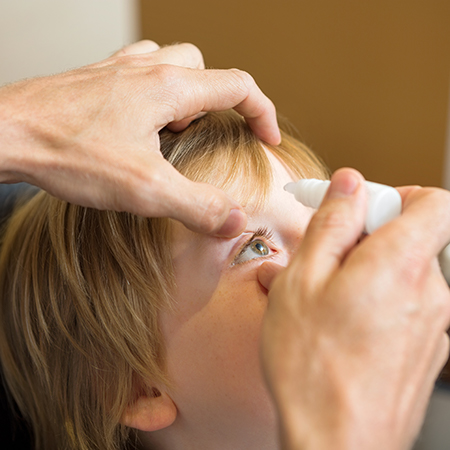
Dry Eye

Dry Eyes or Dry Eye Syndrome is a very common eye condition that affects millions of Americans. It is estimated that dry eyes affect up to 11% of people aged 30 to 60 years of age and 15% of those 65 years of age or older according to the International Task Force assembled by the Johns Hopkins University-Wilmer Eye Institute.
Causes
Simply, dry eyes are caused by either a deficiency in the quantity or the quality of the tears or tear film.
- Environment: Sunny, dry, or windy weather, heaters, air conditioners, and arid high altitudes increase the evaporation of tears from the surface of your eyes. In fact there are a number of cities that have been recognized by the National Women's Health Resource Center as being "Dry Eye Hotspots." You may experience dry eye symptoms while viewing television, computer screens, while reading or doing anything that reduces your rate of blinking.
- Aging: During the normal aging process, our bodies and our eyes produce gradually less and less oil. This reduction in oil in the tear film results in quicker evaporation leading to the formation of dry spots on our eyes.
- Contact Lenses Contact Lenses are subject to dehydration or loss of their water content. As they dehydrate, they can absorb the tear film causing dry eye symptoms. In some cases, the continued drying of the contact lens surface causes it to become deposited with protein making the lenses even more uncomfortable than the dryness alone.
- Medical Conditions Women experiencing hormonal changes, those patients suffering from thyroid disease, rheumatoid arthritis, psoriasis, eczema, acne rosacea and a number of other systemic conditions may experience dry eye syndrome.
- Medications Diuretics taken for high blood pressure, allergy medication, antihistamines, acne medications and many others may all produce dry eye symptoms.
- Others Incomplete closure of the eyelids, eyelid disease and a deficiency of the tear-producing glands are other causes. Recent research suggests that smoking, too, can increase your risk of dry eye syndrome.
Symptoms
Common symptoms include:
- Dryness
- Itching
- Burning
- Irritation or grittiness
- Redness
- Blurry vision that gets clearer as you blink
- Light sensitivity
- Excessive tearing
Treatments
There are several methods to test for dry eyes. One test, called the tear break-up time (TBUT), involves the use of fluorescien eye drops, which include a special dye that can viewed with a blue filter. This test measures the time required for tears to naturally evaporate and diffuse after blinking. Decreased tear break-up time results in an insufficient quatity of tears to keep the eye sufficiently lubricated. Dry eye symptoms occur and worsen as the tears evaporate and diffuse before they can be replaced.
Treatments vary depending on the level of dry eye syndrome. Most people can use artificial tears or similar eye drops or ointments. However, being that dry eye is often chronic in nature, many people can benefit from prescription eye drops that stimulate more of our own natural tear production. Oral supplements can help the eyes maintain tear production and guard against tear loss. It is best to ask an eye care professional what treatment plan is better suited for your eyes.
Temporary or permanent punctal plugs may also be used to treat dry eye syndrome, which block the drainage of tears and conserve them in the eyes longer.
Contact us today to schedule an appointment to determine your individual eye health and create a treatment plan that works best for you.